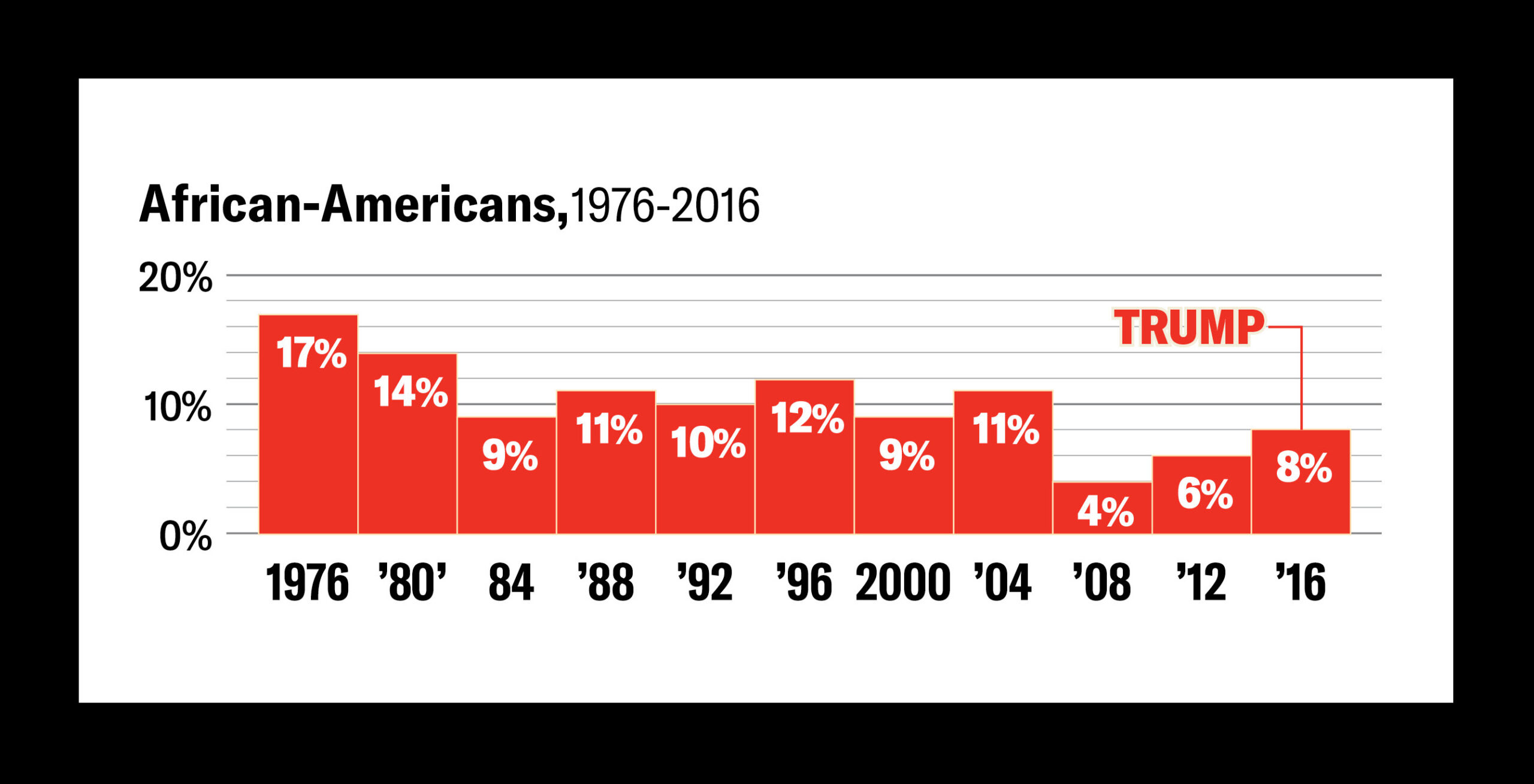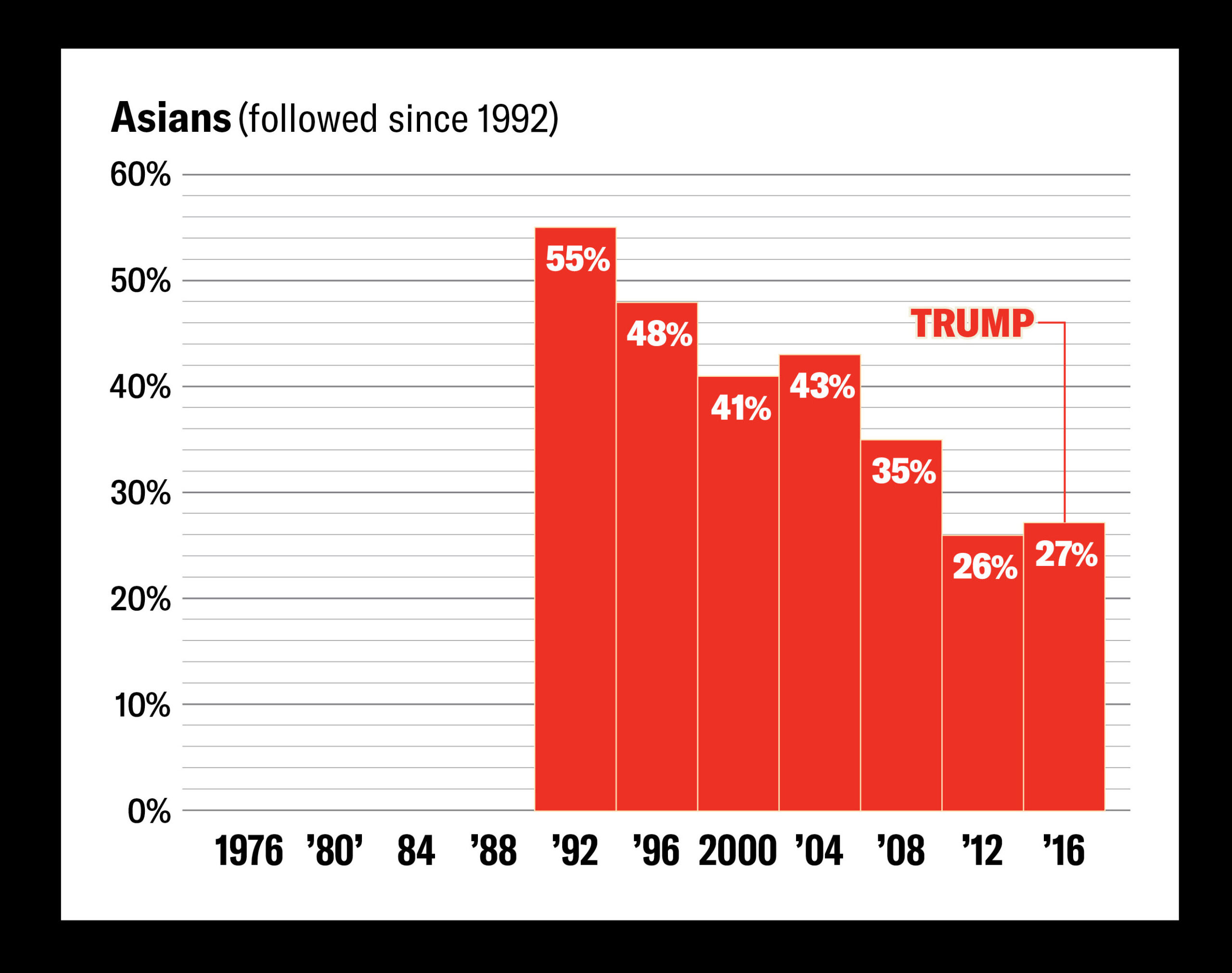President Trump raised eyebrows earlier this year by claiming that Republicans were on the cusp of a major breakthrough with Hispanic voters. “Many Hispanics will be coming over to the Republican side, watch!” he tweeted in January. It’s not the first time he’s made such a prediction. Under fire for his rhetoric about illegal immigration in his campaign announcement speech, then-candidate Trump vowed to win over Latinos.
“I think I’ll win the Hispanic vote,” Trump declared at the U.S.-Mexico border all the way back in 2015. “I have thousands of Mexicans and Hispanics [working for me] and I think when it comes right down, I don’t know if you saw the polls, but they just did a big poll in Nevada, the state of Nevada, and I’m way ahead. … More importantly, as far as I’m concerned, I’m way, way ahead with Hispanics.”
Trump did not actually win the Hispanic vote, nationally or in Nevada. But neither did he do worse than the typical Republican. In fact, he slightly outperformed Mitt Romney in the polls, carrying 29 percent of Latinos to the 2012 GOP nominee’s 27 percent. Nor did the Republicans’ share of Hispanics hit rock bottom in the midterm elections last year.
The giant survey of last November’s midterm voters conducted by the Associated Press found that 32 percent of Hispanics cast their ballots for Republican candidates. That’s higher than some other exit polls, which still found that about 1 in 4 Hispanic voters backed Republican House candidates in an election billed as a referendum on Trump.
It’s worth remembering that many journalists and political analysts predicted Hispanic support for Republicans would collapse once Trump became the face of the party. “Donald Trump could take a historically low share of the Hispanic vote in the 2016 election,” predicted Washington Post politics reporter Aaron Blake, who later added, “But what Trump’s campaign is also showing is the potential for GOP disaster in the years ahead.”
“By placing Donald Trump at the top of the ticket and indulging his nativism and xenophobia, the Republican Party has said with its actions that it doesn’t want Latinos in its tent,” argued columnist Jamelle Bouie, writing in Slate. “Republicans may thus end up estranged from another group of nonwhite voters — not because there aren’t conservative or right-leaning people in the Latino community, but because the GOP has shown itself hostile to the idea of a pluralistic, multiracial America with room and opportunity for Americans of all origins.”
[Related: Pew: Evangelicals strong for Trump, black Protestant support steady]
The precedent these commentators had in mind was black voters. Almost uniformly Republican after the Civil War, African-Americans swung dramatically to the Democrats following the Great Depression, becoming a crucial part of the New Deal coalition. But even after four terms of Franklin D. Roosevelt and Harry Truman’s desegregation of the armed forces, a substantial number of blacks continued to vote Republican. Dwight Eisenhower approached 40 percent of the black vote in his 1956 re-election bid. Richard Nixon received 32 percent in the 1960 race against John F. Kennedy. But four years later, Republicans nominated Barry Goldwater, one of just six GOP senators to vote against the Civil Rights Act of 1964, to run for president against Lyndon B. Johnson, who signed the landmark bill into law. The GOP share of the black vote plummeted to just 6 percent and never again topped 15 percent in a presidential election.
From the moment Trump declared in his campaign announcement that Mexico was sending drugs, rape, and other crime — “and some,” he added, “I assume, are good people” — it was widely believed that he would have a Goldwater effect on Hispanic voters and the GOP. He followed his hard-line immigration stance with attacks on the impartiality of Gonzalo Curiel, a federal judge of Mexican ancestry, that were described by then-House Speaker Paul Ryan as the “textbook definition of a racist comment.”
So far, however, that has not happened. “A sizable bloc of Latino voters have remained aligned with Republicans in the Donald Trump era,” observed FiveThirtyEight’s Perry Bacon Jr., who later noted, “The Latino vote in 2016 and 2018 was pretty similar to what it was in elections held before President Trump became the defining figure of the GOP.” While predominantly Democratic, subsets of Hispanic voters, such as evangelical Protestants and military veterans, are politically conservative. Winning even 25 to 30 percent of the Hispanic vote helped Republicans to victory in key races in Texas and Florida last year.
By contrast, black voters have remained overwhelmingly Democratic. Yet even here pundits have been surprised not to see slippage while Trump supporters tout signs of modest progress. “Memo to black men: Stop voting Republican,” blared the headline of a piece by Boston Globe columnist Renee Graham. “What is up with all the black men who voted Republican in the Georgia governor’s race?” asked Vanessa Williams in the Washington Post.

Exit polls showed somewhere between 8 and 11 percent of black men voted for Republican Brian Kemp over African-American Democrat Stacey Abrams in the Georgia gubernatorial contest. GOP Sen. Ted Cruz took 17 percent of black men in his Texas re-election race against then-Rep.Robert Francis “Beto” O’Rourke, who is now seeking the Democratic presidential nomination. These defections were mostly offset by near-uniform support from black women for Democratic candidates, but the African-American gender gap that narrowed under Barack Obama appears to be widening again.
[Also read: House Democrat: Trump trying to suppress minority vote with census citizenship question]
“I don’t think you can extrapolate much of anything from the 2018 Senate race and assume it somehow applies to any other race,” said Chris Wilson, a Republican pollster who worked for Cruz’s campaign. “The 2018 contest was an anomaly for several reasons (money, organization, candidates, etc.), so to make assumptions about other races or support for other candidates based on 2018 would be, in my opinion, a mistake.”
Still, the results were jarring to those who find the Trump administration frightening for racial minorities. “How can so many black men still align with a party that, now more than ever, is unified by identity politics?” demanded the Globe’s Graham. “The Republican Party is not the party of Lincoln. It is the party of white supremacy, migrant family separations, racist fearmongering, and Brett Kavanaugh.”

Trump’s minority supporters are encouraged. Bruce Levell, a member of the National Diversity Coalition for Trump and an adviser to the president’s re-election campaign, has been involved in Republican politics since Ronald Reagan. He admits that being a high-profile black Trump booster has at times been stressful. But he is undeterred. “We’re going to double our percentage of the black vote next year,” Levell said confidently.
It’s a paradox that Trump has paired a large number of racially tinged controversies, hitting a nadir with an equivocal response to the fatal white nationalist rally in Charlottesville, with some of the most aggressive sales pitches to minority voters of any recent Republican presidential nominee. “What the hell do you have to lose?” Trump famously asked. The formulation was widely mocked, but Levell maintained he had personally seen this line of argument work.
“Your neighborhood is 80 or 90 percent black, but you [blacks] don’t own the grocery store, don’t own the gas station,” Levell said. “You wouldn’t send your kids to the school there anymore. You keep voting for Democrats. What the hell do you have to lose?” He recalled an elderly black janitor who was moved on this basis to vote for Trump despite strong social pressure, including from his own family, to remain in the Democratic fold.
[Opinion: Democrats will have a post-Trump Latino problem]
Trump has a number of prominent black surrogates, some of whom have become household names: YouTube sensations Diamond and Silk, Turning Point USA activist Candace Owens, Pastor Darrell Scott, campaign adviser Katrina Pierson, television pundit Paris Dennard. They hope for a black exodus from the Democratic Party — a “Blexit,” to be precise — but face heavy criticism. “[Trump] is very aware of the pressure and the toll it takes on African-American supporters,” Dennard told the New York Times last month.

The president is quick to tout record low unemployment rates among blacks and Hispanics and, of course, any polls that show him winning over either voting bloc. “When you look at the Hispanic polls, I’m up 19 percent,” Trump said at the White House in apparent reference to an NPR/Marist poll that saw his Latino approval rating jump from 31 percent in December to 50 percent in January. Trump similarly celebrated a Rasmussen poll that showed his black approval rating at 36 percent. When a Reuters poll found Trump’s black male approval doubling from 11 percent to 22 percent shortly after rapper Kanye West donned his MAGA hat, supporters crowed about the “Kanye effect.”
Such proclamations drive Democrats, and many pollsters, crazy. They point to the small sample sizes of these polls compared to other surveys where Trump has single-digit black support. A March HuffPost/YouGov poll, for example, shows 55 percent of black voters and 37 percent of Hispanics think Trump “supports white nationalism.”
[Also read: Rick Scott chased the Hispanic vote and got it]
“These data remind us to be skeptical of outlier polls — especially when those results fly in the face of what we already know about African-Americans’ weak support for Republican presidents in general and their strong disapproval of Donald Trump in particular,” Michael Tesler, associate professor of political science at the University of California, Irvine, wrote in the Washington Post. The polling firm Latino Decisions has even contended that the network exit polls overstate Trump’s Hispanic support, in part by undercounting Spanish speakers, and might be missing the ethnic group’s abandonment of the GOP. But the question of how many nonwhite voters are in play under Trump remains contested.
“I think the best thing going for the Trump campaign is the Trump record with minority voters,” said Republican strategist John Feehery. “The booming economy, the eye-popping job numbers, criminal justice reform and the high-profile pardons will have a much bigger impact than anything like Blexit, which seems to me to be a little too contrived.”
“The more interesting question is not the rise or fall or rise again of small numbers of black conservative spokespeople and voters, but the broader question of why the GOP can’t appeal to African-Americans now in ways that had been so important in the past,” said Angela Dillard, an associate dean at the University of Michigan and author of the book Guess Who’s Coming to Dinner Now?: Multicultural Conservatism in America. “But I understand the interest in Candace O. and others. Her Blexit is pretty funny.”
Trump’s complicated dance on race predates his entry into presidential politics. He appeared with the likes of Jesse Jackson and Al Sharpton while donating to civil rights groups, and he boasted of acquaintances with such black celebrities as boxer Muhammad Ali. But Trump also took out full-page ads against the minority defendants in the Central Park jogger case whose convictions were later vacated, and his company faced housing discrimination allegations.
“[A]t the end of four years, I guarantee you that I will get over 95 percent of the African-American vote,” Trump said in 2016. “I promise you. I will produce.” That, like his prediction he would win a majority among Hispanics, is not going to happen. But so far, his biggest effect has been on suburban white voters, not blacks or Hispanics, and his relatively small number of ardent nonwhite fans hope to grow their ranks in 2020. “I’m ride or die with Trump,” said Levell. “Ride or die.”
W. James Antle III is the editor of the American Conservative.
